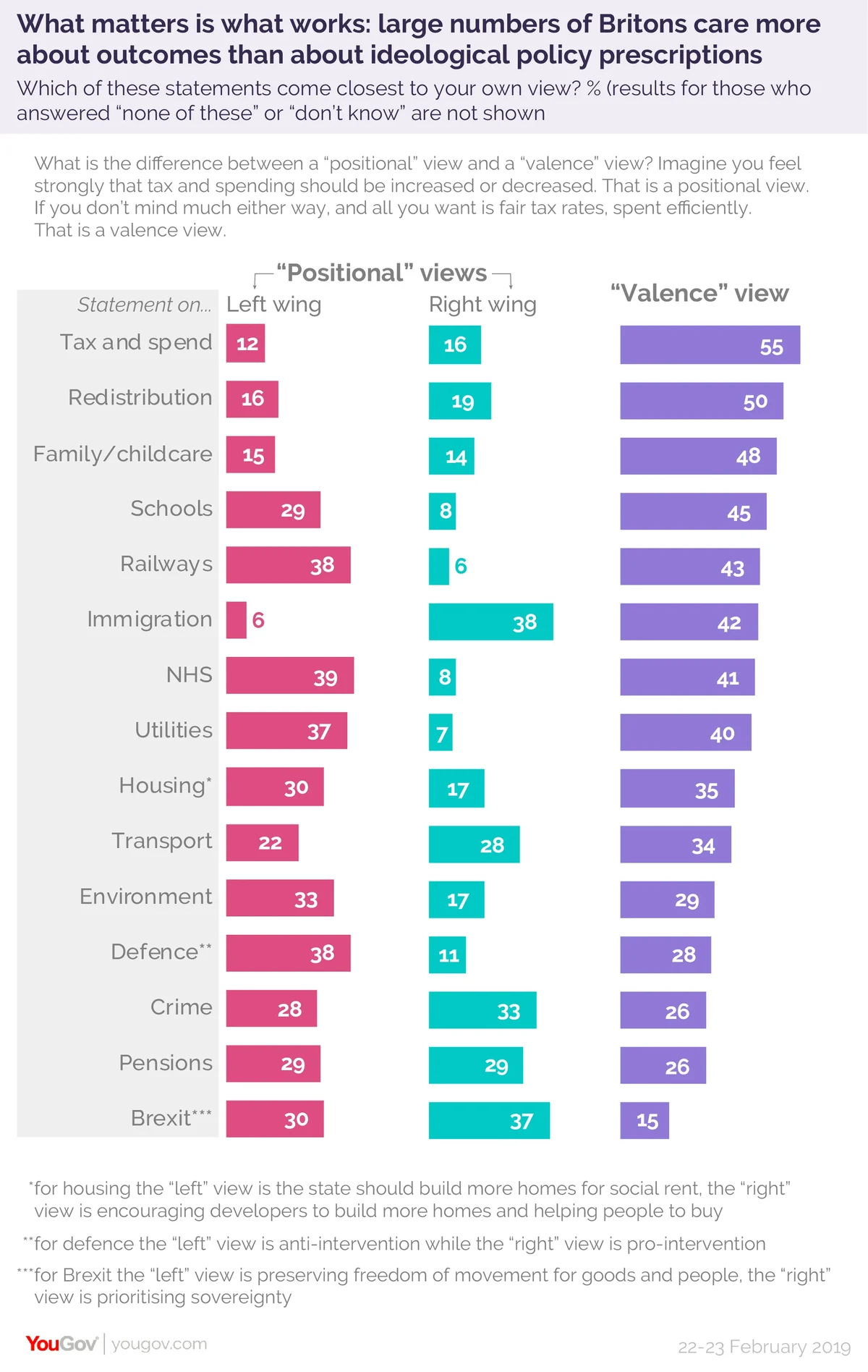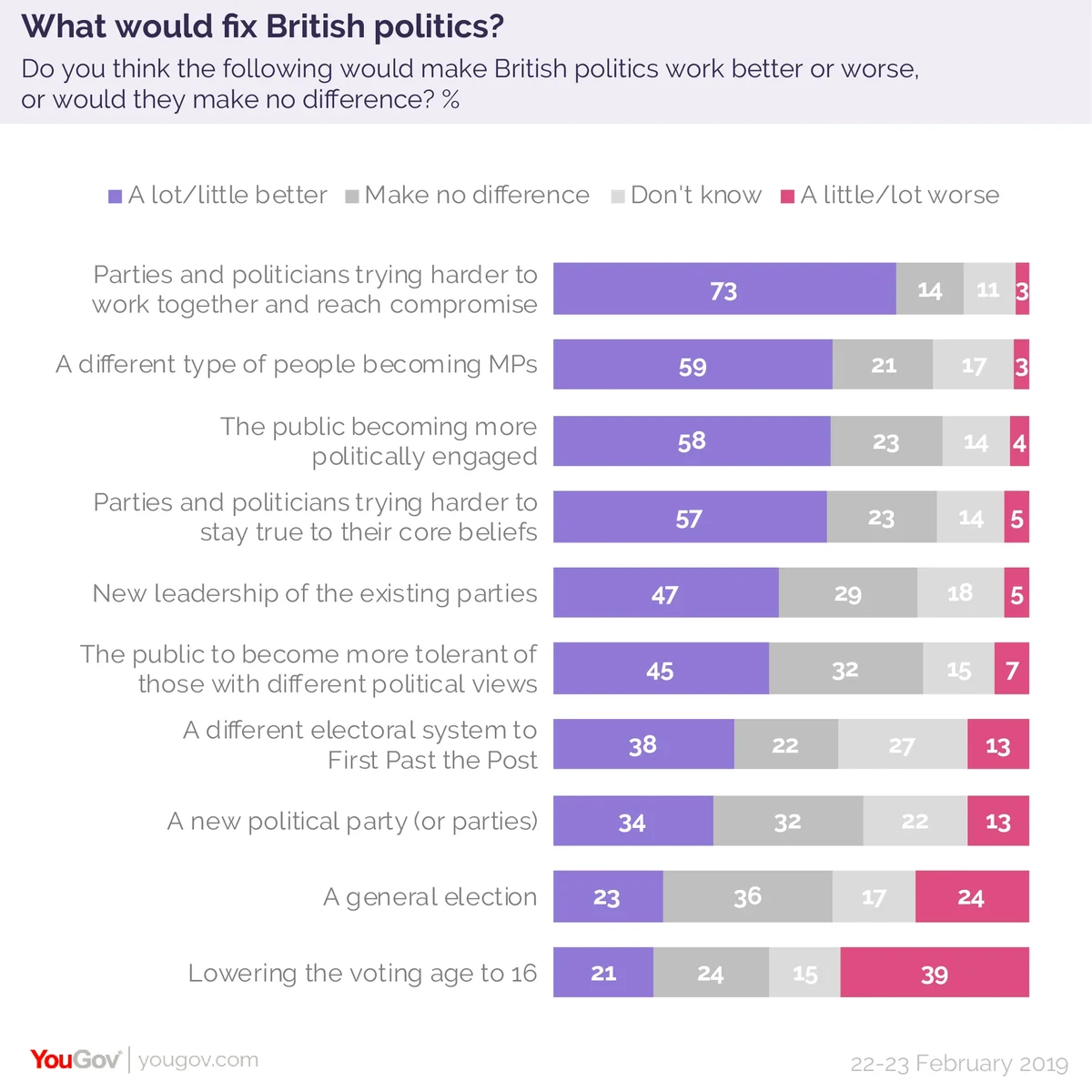There seems to be a gap for TIG to seize, but are they well-placed to do so?
The emergence of The Independent Group (TIG) has reignited debate about whether there’s space in British politics for a dedicated centre party.
Their initial polling figures look good, should they decide to move on from being an informal group to form an official political party: the latest YouGov data suggests they’d scoop 18% of the vote.
However, much of this is likely to be down to the novelty and excitement which surrounds them. When the SDP emerged in 1981 they too were met by ecstatic support in the opinion polls, with the SDP-Liberal alliance polling more than 50% at one point later that year. But, ultimately, this level of enthusiasm couldn’t be sustained.
An additional problem is that the most recent general election featured a Conservative party perceived to have shifted to the right, and a Labour party perceived to have shifted further left than it had in years, yet their combined share of the vote was higher than it had been in almost half a century. Is there even an appetite in Britain for a new party of the centre?
At the most fundamental level, you could point to the fact that one in five Britons (21%) describe their own political position as “centre”. Depending on your point of view you could also add to that figure the 12% who said “slightly left of centre”, and the 15% who said “slightly right of centre”. This would suggest that almost half of the population occupy the political centre ground.
This does of course assume that Britons truly understand the left-right axis in the same way that political scientists do: our data shows that 31% say ‘don’t know’ when asked where they sit on the spectrum, and forthcoming YouGov research will reveal that half the population can’t identify where on the spectrum most stereotypical left and right wing policies sit.
Many Britons care more about outcomes than about ideological policy prescriptions
Centrism could, to a certain extent, be seen as the absence of ideology – a rejection of the policy approaches dictated by the ideological tenets of left and right. As that most centrist of Prime Ministers, Tony Blair, famously said: “what matters is what works”.
The ideologically-inclined will tend to take a positional view on a matter. For instance, when asked about redistribution of wealth, 35% of Britons take a positional view: 16% said that “the Government should do far more to help the poor, and tax everyone else more to pay for this help”, while 19% said “the poor should take far more responsibility for their own circumstances; the Government should hand out less money in benefits, and reduce taxes”.
But half of the population (50%) gave what is called a “valence answer”, i.e. one in which they are not interested in the position, only the results. The valence answer in this case was “What matters is not whether taxes and benefits go up or down, but whether the Government distributes welfare benefits fairly and sensibly”.
The above question was part of a battery of 15 on policy approaches we put to the British public. For 10 of them the valence answer was the most commonly given response (between 34 and 55%, depending on the issue).
You can see all the positional and valence statements this chart is based on at the bottom of the page
In an era when the two main parties are more committed to their respective ideologies, it is these Britons who care more about results than they do about ideology that could provide bedrock support for a new centrist party
Promisingly for TIG, on issues that the public say matter most to themselves and their families, there are high numbers of people who take the valence view.
Four in ten (42%) of those who say that the NHS is one of the top three most important issues to themselves and their family don’t care about the level of private provider involvement in the service, so long as it is run in a way that benefits patients the most.
Likewise, when it comes to the economy, 62% listing it as a top issue don’t care about the overall level of government spending and taxes, so long as the state taxes fairly and spends efficiently.
Brexit, however, is the most commonly cited top issue facing Britain, and on this just 14% who see it as such take the valence view (that they don’t mind what approach is taken between ensuring sovereignty and preserving free movement of goods and people, so long as disruption is kept to a minimum).
Fortunately, though, this is one of the areas on which The Independent Group’s view is clear. The well documented support among TIG’s MPs for a second referendum sets them firmly on the side of the 45% of Britons who prefer the free movement option.
Britons agree that politics is broken, but it’s not clear whether they back TIG’s solution to fix it
The existence of the centre ground does not necessarily mean that TIG can seize it, however. While they can ride high on novelty value for a time period, they will sooner or later have to start taking positions on policy and persuading the public that TIG’s vision for the country corresponds with their own.
To go by their own slogan, TIG have launched on the premise that “politics is broken”. The public overwhelming agree with this diagnosis: just 9% think that British politics is working well, while a whopping 82% think it is working poorly (including almost half the nation – 47% – think it is working “very” poorly).
While they have remained tight-lipped on policy, The Independent Group have sketched a prescription for fixing Britain’s broken politics by “reaching across outdated divides and tackling Britain’s problems together”. The public also seemingly agree with this line of thinking, with 73% saying that “parties and politicians trying harder to work together and reach compromise” would serve to make British politics work better.
But the public are a fickle bunch: the majority (57%) also said that the seemingly contradictory solution of “parties and politicians trying harder to stay true to their core beliefs” would also serve to improve the working of British politics.
TIG will also be disappointed to discover that only 34% of Britons believe that a new political party will make things any better. About as many (32%) think it will make no difference, while 13% think a new party will only make things worse.
The public also seem to back the idea that the wrong kind of people represent them in the House of Commons. The majority – 59% – say that a different kind of people becoming MPs would help to fix British politics. This was the second most agreed upon solution.
It is hard to argue that the TIG MPs represent the kind of people the public probably has in mind when it says this. The Independent Group’s most visible members Anna Soubry and Chuka Umunna were both lawyers (with Soubry also having been a journalist), while Luciana Berger worked in management consultancy and public affairs. Both former Labour MPs were only around the age of 30 when they first became MPs.
The traditional foe: first past the post
There clearly is an appetite for a new force in British politics. Such desire for change will certainly not hurt TIG, although it doesn’t necessarily follow that it benefits the political centre specifically. Dissatisfaction with traditional politics in the West have brought both Emmanuel Macron and Donald Trump to power.
Ultimately, even if TIG do manage to carve out territory in the political landscape, they may well come to flounder upon the rocks that have dashed the hopes of many new parties: first past the post. In 1983 the SDP-Liberal alliance gained a remarkable 25.4% of the vote, and a mere 12 seats in Parliament. In the end, all the centrist support in the country might not be enough to break the stranglehold that the more ideologically inclined main parties hold on the nation’s constituencies.
Photo: Getty
See the valence results here (or interact with them the Crunchbox below) and the rest of the results here


















